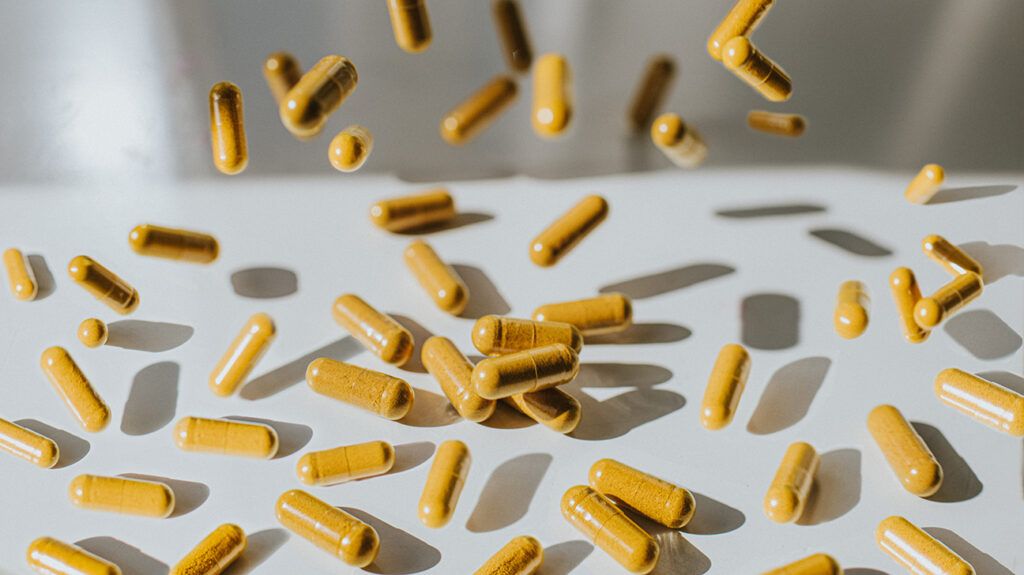Researchers believe turmeric can help reduce depressive symptoms. Proper use and professional guidance can help you determine if this is a healthy option for you.

Turmeric, a vibrant yellow spice commonly used in Indian dishes, has gained attention in recent years for its health benefits beyond the culinary world.
One area of interest is its potential role in mental health, including the treatment of depression.
In particular, the spice’s active compound curcumin has been studied for its antioxidant and anti-inflammatory properties, which may contribute to its antidepressant effects.
A member of the ginger family, turmeric is a bitter golden-orange spice that’s long been recognized for its therapeutic properties in traditional Ayurvedic and Chinese medicine.
Turmeric contains an active compound called curcumin, which is known for its antioxidant, anti-inflammatory, and antimicrobial properties. Curcumin has been studied for its potential role in various health conditions, including arthritis, neurodegenerative diseases, and depression.
Curcumin, the main active component in turmeric, has been used for centuries in Ayurvedic medicine to treat numerous conditions, including anxiety and depressive disorders.
- neurotransmitter levels
- inflammation
- brain plasticity
- stress response
- insulin resistance
- oxidative stress
- endocannabinoid system
A 2019 review found a significant effect of curcumin on depressive and anxiety symptoms.
The findings suggest that curcumin, if added to standard care, might improve depressive and anxiety symptoms in people with major depressive disorder (MDD). But larger studies, particularly in Western countries where curcumin isn’t typically in the diet, are needed to confirm these findings.
Drugs used in depression are thought to target serotonin, noradrenaline, and dopamine which are associated with neurotransmitter. It’s suggested that curcumin increases the availability of dopamine and serotonin, possibly by stopping monoamine oxidase (MAO) which regulates levels of these transmitters.
In addition, 2016 research examining the effects of curcumin on depression induced male albino rats indicates that curcumin normalizes the levels of these neurotransmitters.
Can you take turmeric with antidepressants?
While it’s always important to check with your doctor before adding supplements to your medication regimen, some evidence suggests that curcumin may work well with antidepressant medications and even enhance their effects.
In a 2015 study, 108 male participants, ages 31 to 59, took two capsules of either 1,000 mg of curcumin or placebo along with their antidepressants for 6 weeks.
Many studies have shown that the addition of curcumin to regular medications improved the effectiveness of treatment, as outlined in this
The findings show that participants who supplemented with curcumin exhibited lower markers of inflammation and had a significant reduction in depressive symptoms.
Possible risks and side effects
While turmeric and curcumin are generally considered safe when taken in moderate amounts, high doses or long-term use of turmeric or curcumin supplements may pose risks for certain individuals, including:
- gastrointestinal issues (stomach ache, diarrhea, nausea)
- interactions with medications (blood thinners) such as warfarin, antiplatelet drugs, and nonsteroidal anti-inflammatory drugs (NSAIDs)
- potential allergic reactions
- pregnancy and breastfeeding (safety has not been established for high doses of turmeric in pregnancy)
- liver toxicity (rare reports of liver toxicity)
- may worsen other health conditions (gallbladder disease or diabetes)
There are several ways you can take turmeric. If you’re consuming the powder, be sure to mix it with black pepper as it helps with absorption.
- Turmeric powder: Turmeric is available in powder form and can be used as a spice in cooking.
- Turmeric capsules or supplements: Capsules are a good choice if you want a standardized dosage or don’t like the taste of turmeric. Both turmeric and curcumin supplements are available.
- Turmeric tea: Turmeric tea is made by boiling turmeric powder or grated turmeric root in water, along with other spices and flavorings such as ginger, black pepper, and honey.
- Golden milk: Golden milk can be made by mixing turmeric powder or grated turmeric root with warm milk, sweeteners (honey or maple syrup), and other spices (cinnamon and ginger).
- Turmeric paste: Turmeric paste is made by mixing turmeric powder with water or oil to form a thick paste, which can be used as a base for various recipes. Turmeric paste can be used in cooking or even applied topically as a face mask or skin treatment.
- Fresh turmeric root: Fresh turmeric root can be used in cooking by grating or chopping it and adding it to recipes.
The FDA doesn’t monitor dietary supplements the same as conventional food and drugs. It’s important to obtain a safe product from a reputable manufacturer.
Turmeric, and specifically curcumin, exerts powerful antioxidant and anti-inflammatory effects, which may help relieve depression in some people.
If you believe your depression is caused or worsened by chronic inflammation — a form of long-term, low-level inflammation — curcumin may be especially helpful. Consider talking with your healthcare provider to be sure it’s safe to take turmeric or curcumin supplements.
